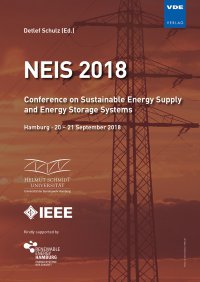Autonomous Versus Coordinated Control of Residential Energy Storage Systems – Monitoring Profit, Battery Aging, and System Efficiency
Konferenz: NEIS 2018 - Conference on Sustainable Energy Supply and Energy Storage Systems
20.09.2018 - 21.09.2018 in Hamburg, Deutschland
Tagungsband: NEIS 2018
Seiten: 7Sprache: EnglischTyp: PDF
Persönliche VDE-Mitglieder erhalten auf diesen Artikel 10% Rabatt
Autoren:
Hesse, Holger C.; Englberger, Stefan; Truong, Cong Nam; Jossen, Andreas (Institute for Electrical Energy Storage Technology, Technical University of Munich (TUM), Arcisstr. 21, 80333 Munich, Germany)
Inhalt:
Residential storage systems are increasingly installed in households with photovoltaic generation. While self-consumption and self-sufficiency can be increased notably with PV-coupled battery systems, grid relief and profitability remain low in most scenarios investigated in the literature. At the same time, several electricity sharing and co-ordinated control of a “swarm” of multiple storage systems is a hotly debated topic at present. However, these announcements come short in their technical analysis and economic value assessments. In this contribution, we derive an optimized power flow for a microgrid community with distributed but centrally controlled storage systems. By linking a linear programming optimization for the microgrid control to a detailed non-linear modeling of power flow via individual storage systems, we are able to optimize the battery storage system operation and at the same time obtain accurate technical and economic results. The overall economic potential and the maximum grid relieving potential of sharing energy in the microgrid is derived and compared to an autonomous operation of storage systems. For the exemplary simulation data chosen, a profitability increase of 1.5% per household and a grid relief indication of 13.5% lower power dissipation losses on the low-voltage lines was achieved. At the same time, the detailed simulation of all battery storage systems in the microgrid reveals reduced battery aging and improved storage system efficiencies.


